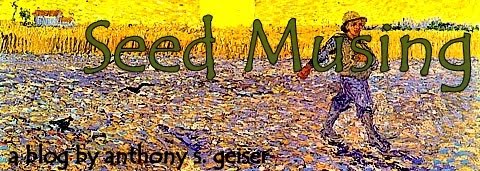“What It Means To Listen”
Through 4 posts over the last week or so, I have had the following thoughts on the Parable of the Sower and the passages that follow it:
- The Parable of the Sower is NOT about evangelism.
- The Seed is the Word of God.
- The Sower is God, NOT us.
- There are 4 types of soil: The Path, The Rocky, The Thorny
& The Good. - The “Hearing” Verses Make 3 Passages One Story (vs 8, 18, 21)
- A seed growing into a plant is like a lamp on a stand - it can be clearly seen by everyone!
- The seed may be concealed for a time, but it will be brought out into the open as it grows!
- We are to be careful how we listen - for it determines the destiny of our seed!
As we read about in Part 4, verse 18 of Luke 8 tells us to be careful how we listen. So, how do we do that?
Well, a good deal of my whole argument hinges on the fact that we should read this passage in context, remember?
So, let’s continue on and look at the next few verses in Luke 8:18-21.
~~~~~~~~~~~~~~~~
18Therefore consider carefully how you listen. Whoever has will be given more; whoever does not have, even what he thinks he has will be taken from him."
19Now Jesus' mother and brothers came to see him, but they were not able to get near him because of the crowd. 20Someone told him, "Your mother and brothers are standing outside, wanting to see you."
21He replied, "My mother and brothers are those who hear God's word and put it into practice."
~~~~~~~~~~~~~~~~
So, Jesus’ mother and brothers want to see him, but for some reason – instead of just letting them in or telling them to wait - Jesus simply says that his family is those that “hear God’s word and put it into practice.”
If we say that we’re in “God’s family” simply because we prayed a prayer at 5 because we wanted to avoid hell, we might want to rethink that. If we were raised in a Christian home going to church every Sunday and because of that, we think that we’re a Christian – we need to hear God’s Word on the subject.
As I started studying the New Testament, I would read the words of Jesus in the Gospel and see how I wasn’t acting like Him at all. My attitudes were all wrong to go along with actions that were selfish. Then, I would read what Paul and Peter say in the epistles and I would shake my head because my life did not line up with what they were saying the Christian life should look like. I was constantly coming up this mirror of the Word of God, and seeing where I failed.
I have been studying the word of God diligently the past few months (after years of struggling to do a “quiet time) and I have come to the conclusion over and over as I read the Bible that I need to repent. For too long I have had hidden sin (it’s never hidden from God by the way – only from men) and frankly my desire was not for God but rather for the things of this world. I didn’t always desire God, but I always desired to look like I desired Him. So, I would go to church and tried to look good (as good as I can!) but inside I knew that my heart was wicked and dark.
In fact, my repentance towards God has nearly been daily of late as God’s word (the seed) has challenged my long-held religious views about life and God. (I grew up in church, remember?) My perspective has changed in that I am no longer focused on what OTHERS do with the Word of God. In other words, I am no longer focused on what types of soil THEY are. Also, the struggle to study the Word of God dissipates as I think about it being a “seed” that will be planted in the soil of my heart – I want to plant that seed a lot and see it grow.
No, I am now focused on what I do with the Word of God. I am focused on what type of soil I am. I am focused on allowing the Sower to sow as much seed as He wants in my life. It is about how I put the Word of God into practice in my own life and has NOTHING to do with what other people and what they do. That is how I know if I am truly listening and hearing what God is saying to me in His Word – When I Obey It.
Does that makes sense? If not, come back for Part 6 on Monday, January 18th, as I try to flesh out these thoughts by going back to the Parable of the Sower.
Thoughts that Impacted Me Today:
9. Careful Listening = Obedience

